Introduction
The Jasmine tea taste, a delightful blend of delicate flavors and captivating aromas, is a popular choice among tea enthusiasts. Its unique combination of sweetness, floral notes, and subtle hints of bitterness provide an exceptional sensory experience for both the novice and connoisseur alike.
But what exactly does Jasmine tea taste like? In this blog post, we’ll delve into the enchanting world of Jasmine tea to explore its taste nuances, health benefits, and pairing suggestions, and answer some frequently asked questions about this remarkable brew.
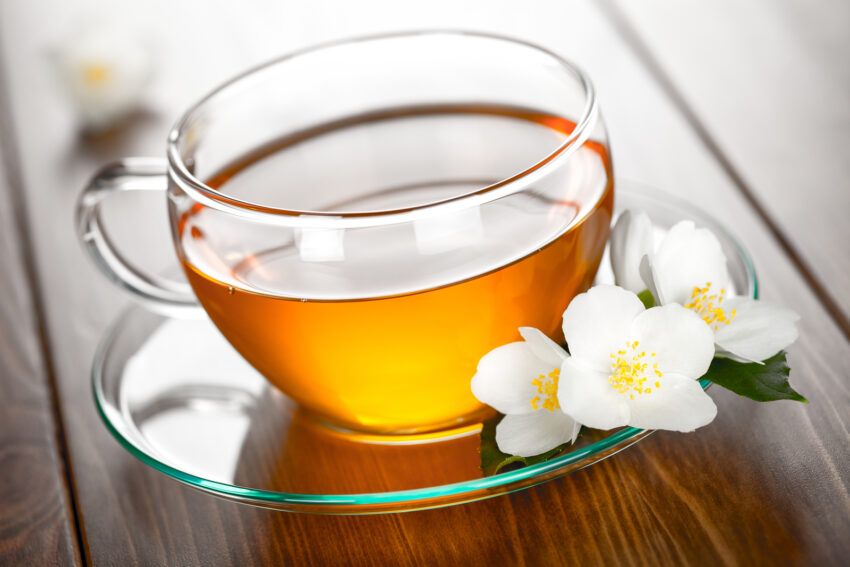
Jasmine tea with jasmine flower on table background
Key Takeaways
- Jasmine tea has a delicate and subtle flavor profile with sweet and floral notes that provide an enjoyable sensory experience.
- It can be made with green, black, or white tea as the base, each providing a unique taste depending on personal preference.
- Drinking Jasmine tea may offer potential health benefits such as aiding in digestion, reducing stress levels, and having possible anti-cancer properties.
- Finally, Jasmine tea is versatile and pairs well with light foods like salads and fruits or desserts such as shortbread cookies or macarons.
What Is Jasmine Tea And what is the jasmine tea Taste?
Jasmine tea is a type of tea that has been scented with the fragrance of jasmine blossoms, resulting in a delicate and subtle flavor profile with hints of sweetness and floral notes, along with a relaxing and rejuvenating aroma.
Delicate And Subtle Flavor With Hints Of Sweetness And Floral Notes
Jasmine tea is known for its delicate and subtle flavor profile, which makes it a favorite among many tea lovers. This unique taste is characterized by hints of sweetness and floral taste, providing an exquisite sensory experience to those who savor its enchanting aroma and flavor.
Jasmine’s purpose in the infusion process is to add just a faint hint of floral essence to the base tea without overpowering it.
For example, imagine enjoying a steaming cup of Jasmine green tea after dinner on a cool evening. The sweet, floral aroma wafts from your teacup as you take your first sip—tasting that intoxicating combination of mild sweetness with refreshing bitterness inherent in quality green teas while simultaneously experiencing alluring jasmine accents that elevate the overall sensory journey.
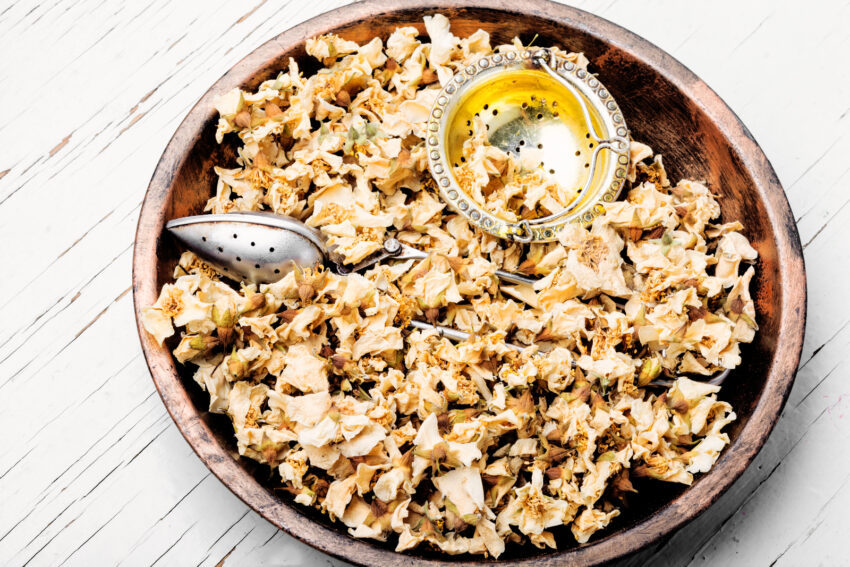
Perfumed Aroma That Is Relaxing And Rejuvenating
The perfumed aroma of jasmine tea is one of its most distinct features. The scent alone can transport you to a state of relaxation, making it the perfect drink to unwind with after a long day.
The fragrance lingers in the air and enhances the overall sensory experience of drinking jasmine tea. The aroma has also been known to have rejuvenating effects on the mind and body, which adds to its appeal as a calming beverage.
Varies In Taste Depending On The Base Tea: Green Or Black
Jasmine tea is usually made with green tea as the base, but it can also be blended with black or white tea. The taste of jasmine tea varies depending on the types of tea used.
Jasmine green tea has a sweet and mild flavor with a floral fragrance, while jasmine black tea leaves will be more robust and potent in taste. The delicate aroma of jasmine adds an extra layer to the flavor profile of the cup of tea, creating a unique sensory experience for every sip.
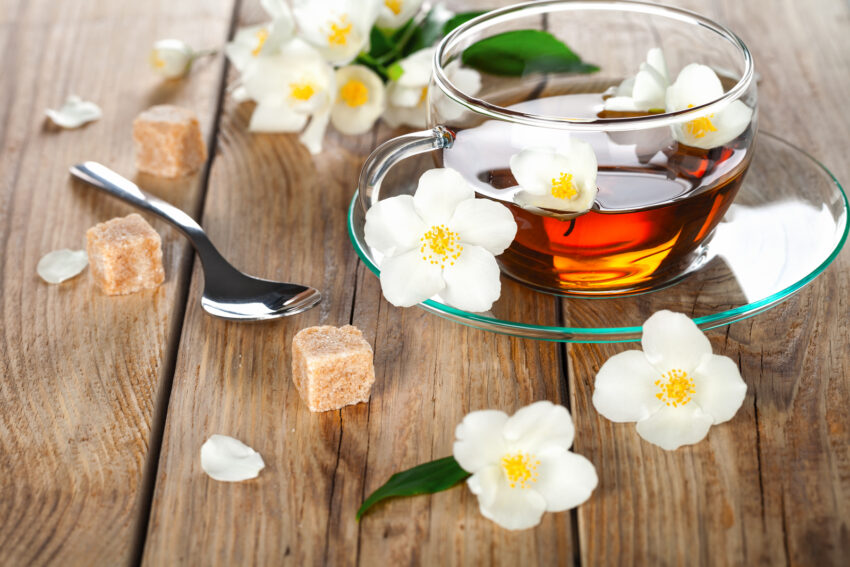
Health Benefits Of Jasmine Tea
Drinking Jasmine tea may provide various health benefits due to its antioxidant properties.
Contains Antioxidants And Aids In Digestion
Jasmine tea is not only a delicious beverage, but it also offers several health benefits. The tea contains antioxidants that help to protect the body against harmful free radicals, which can cause cell damage and lead to chronic diseases like cancer.
Additionally, jasmine tea has been shown to aid in digestion by reducing inflammation in the gut and improving the absorption of nutrients from food.
Helps Reduce Stress And Improve Mood
Drinking jasmine tea is not just a treat for the taste buds, but it can also have a positive impact on your mental health. The floral scent of jasmine has been shown to reduce stress levels and improve mood. It is rumored to aid with heart disease and brain function.
Next time you’re feeling stressed or overwhelmed, try sipping on a hot cup of jasmine tea or indulging in an iced version on a warm day.
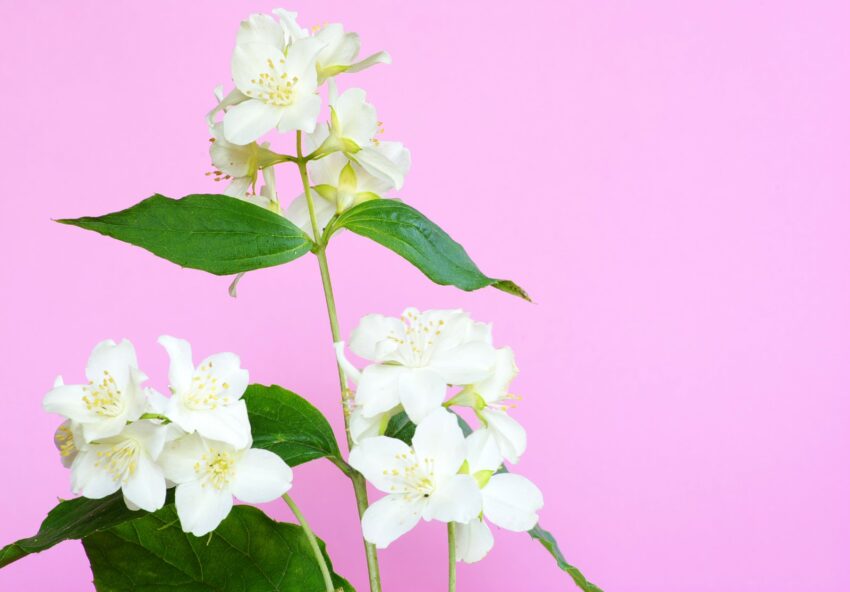
Potential Anti-cancer Properties
Jasmine tea also has potential anti-cancer properties, thanks to its high levels of antioxidants. Antioxidants help to neutralize free radicals in our bodies, which can damage cells and DNA and contribute to cancer development.
Some studies even suggest that compounds found in jasmine tea may specifically inhibit the growth of certain types of cancer cells using the immune system. While more research is needed on this topic, it’s worth noting that drinking jasmine tea regularly as part of a healthy lifestyle could have some protective benefits against cancer.
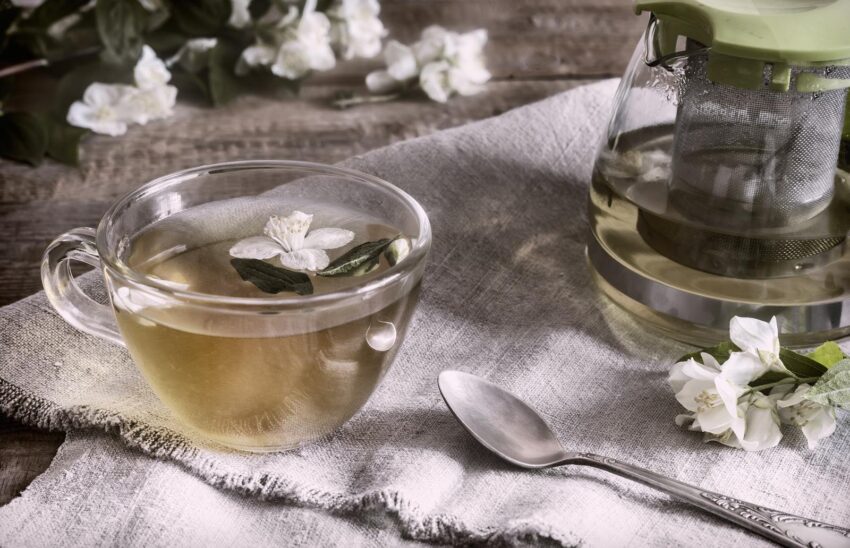
Serving And Pairing Suggestions For Jasmine Tea
Serve Jasmine tea hot or cold and pair it with refreshing foods like salads and fruits, or light desserts such as shortbread or macarons.
Can Be Served Hot Or Cold
Jasmine tea is versatile and can be enjoyed hot or cold, depending on your mood and the weather. The water temperature is up to you. For hot tea, steep some loose-leaf jasmine tea in hot water for 2-3 minutes before enjoying it plain or with a little honey or lemon.
Alternatively, you can brew a pot of iced jasmine tea by refrigerating the tea after brewing with an additional floral accent like rose petals to make it more refreshing.
With its light flavor profile, jasmine tea pairs well with salads and fruit-based desserts like shortbread cookies or macarons. It’s also great on its own as a soothing drink any time of day when you need to unwind or relax.
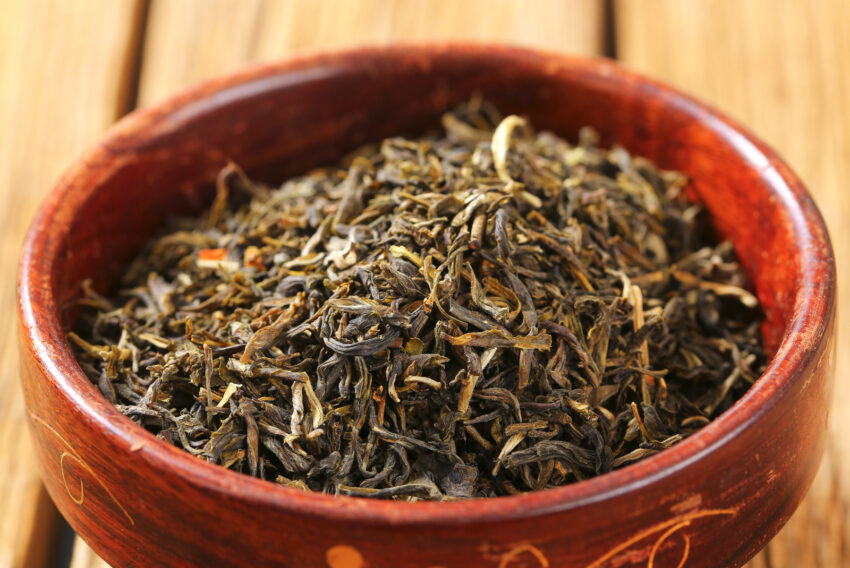
Goes Well With Light, Refreshing Foods Like Salads And Fruits
Common Jasmine tea is a light and delicate beverage that pairs superbly with light, refreshing foods like salads and fruits. The subtle floral notes in Jasmine tea complement the natural sweetness of fruits and veggies, making it an excellent choice to quench your thirst while enjoying a healthy snack. Here are some suggestions for food pairings that go perfectly with Jasmine tea:
- Fresh fruit salad: Jasmine tea’s delicately sweet taste pairs beautifully with fresh fruit salads. Try serving a bowl of mixed berries, peaches, pears, and grapes alongside a steaming cup of green jasmine tea.
- Green salads: A crisp green salad with lots of fresh vegetables, like cucumber, spinach, and avocado, is another delicious pairing for jasmine tea.
- Light sandwiches: Tea sandwiches with cucumber or smoked salmon are a classic favorite to pair with aromatic jasmine tea.
- Light desserts: Shortbread cookies or macarons make for great desserts that go along well with Jasmine tea’s subtle flavor profile.
In summary, drinking Jasmine tea is not only pleasurable but also healthful when accompanied by the right snacks. Whether you’re enjoying your beverage hot or cold, make sure to keep these food pairing suggestions in mind as you savor the unique taste of this aromatic and light-bodied brew.
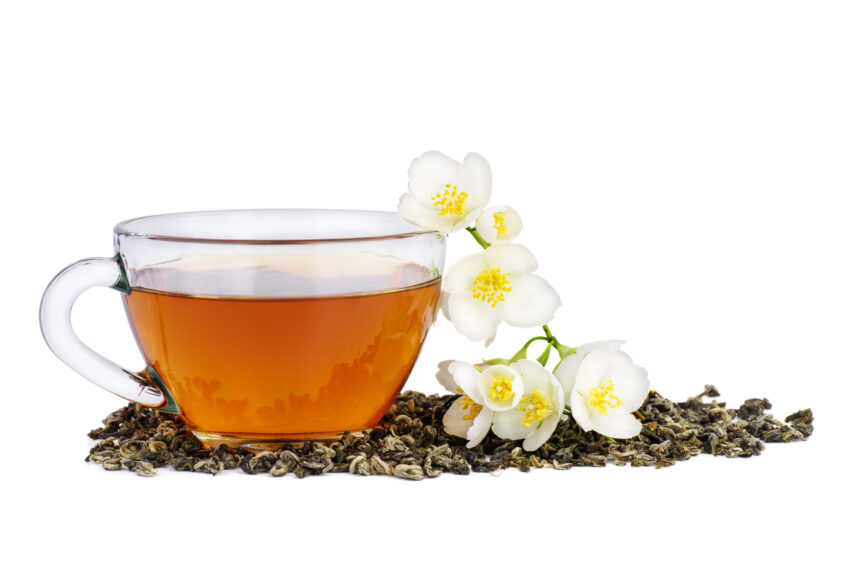
Perfect Pairing With Light Desserts Like Shortbread Or Macarons
Jasmine tea is not just a great drink on its own but it can also be paired with light desserts for a complete sensory experience. The delicate flavor and floral notes of jasmine tea make it a perfect pairing partner for light and refreshing desserts like shortbread or macarons. Here are some reasons why:
- Jasmine tea has a subtle sweetness that pairs well with the buttery and crumbly texture of shortbread.
- The floral notes in jasmine tea complement the delicate flavors of macarons, enhancing their overall taste.
- The perfumed aroma of jasmine tea adds an extra layer of sensory experience to the pairing, making it more enjoyable.
So, the next time you’re enjoying your favorite light dessert, consider pairing it with a cup of delicious Jasmine tea for a complete and satisfying experience.
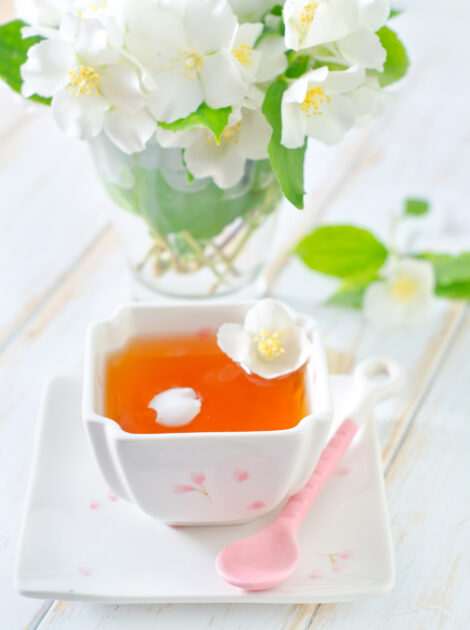
Frequently Asked Questions About Jasmine Tea
What is the caffeine content of Jasmine tea? How is Jasmine Tea traditionally brewed? What is the difference between Jasmine Green Tea and Jasmine Pearls?
Does Jasmine Tea Contain Caffeine?
Yes, jasmine tea usually contains caffeine. The amount of caffeine in jasmine tea will vary depending on the base tea used and how the tea is prepared. Traditional green or black tea bases are often used for jasmine tea, both of which contain caffeine naturally.
However, some versions of jasmine tea may use a white or oolong tea base, which typically has less caffeine compared to green and black teas. If you’re looking for a decaffeinated option, there are also blends available that use herbal teas as the base instead.
It’s important to note that while caffeine can provide an energy boost, too much can also cause negative side effects like jitters and insomnia.
What Is The Difference Between Jasmine Green Tea And Jasmine Pearls?
Jasmine green tea is made by scenting green tea leaves with fresh jasmine blossoms, resulting in a sweet and mild flavor with a delightful floral fragrance. On the other hand, Jasmine tapioca pearls are a type of jasmine green tea that has been hand-rolled into small balls resembling pearls.
The rolling process enhances the tea’s taste and aroma while also extending its shelf life. When steeped, these tiny pearls slowly unfurl to release their delicate flavors and aromas.
How Is Jasmine Tea Traditionally Brewed?
Jasmine tea is traditionally brewed by using loose-leaf tea or tea bags in hot boiling water. The ratio of tea to water depends on personal preference, but a good rule of thumb is to use one teaspoon of loose-leaf jasmine tea or one tea bag per cup of hot water.
To fully enjoy the fragrance and delicate flavor notes, the best way is to not add any milk or sweeteners that may overpower it. Many people also choose to brew jasmine pearls, which are balls of hand-rolled green tea leaves infused with jasmine flowers.
These pearls should be steeped for 3-4 minutes in hot water before enjoying the full mellow taste and floral aroma.
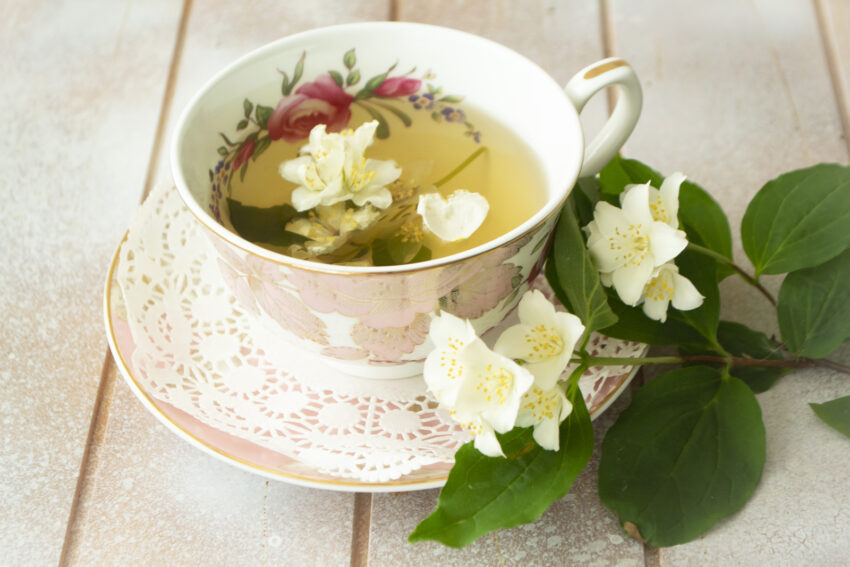
Conclusion: Sip And Savor The Unique Taste Of Jasmine Tea
Jasmine tea has a delicate and aromatic tea that is enhanced by the sweet and floral notes of jasmine. Whether you choose to enjoy it hot or iced, this fragrant beverage will leave your taste buds feeling refreshed and rejuvenated.
With its potential health benefits, including aiding digestion and reducing stress, there’s no reason not to indulge in a cup of jasmine tea.
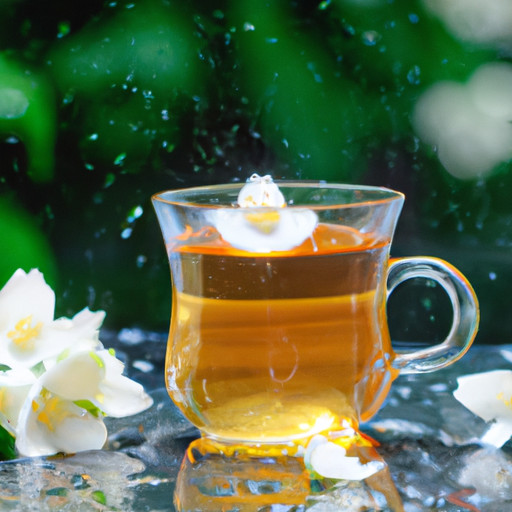
Pingback: Green Tea vs Yerba Mate: Discover The Secrets Now! -